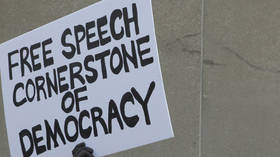‘Woke clickbait’ ruined media, so now they demand censorship – and Big Tech obeys
Silicon Valley tech giants quickly went from heroes to villains in the eyes of the media who fueled outrage for clicks but failed to make money. They’ve responded to this criticism in the worst possible way, by turning censor.
In the most recent incident, YouTube banned videos by the conservative undercover journalism outfit Project Veritas that contained information about Pinterest and that company’s blacklisting of an anti-abortion group Live Action. YouTube described the information provided to Veritas by a whistleblower as a violation of privacy, and therefore unacceptable.
Tech giants retaliating against insider who leaked docs showing censorship of christian and pro-life material. They have REMOVED our investigative insider report. @YouTube now fighting bullet-proof journalism by deleting it. Video still on our website: https://t.co/e45KJp6BsOpic.twitter.com/mwldXVwjVV
— James O'Keefe (@JamesOKeefeIII) June 12, 2019
Last week, dozens of channels were demonetized or banned outright in what was dubbed the “Vox Ad-pocalypse,” after a journalist at the liberal outlet Vox complained that conservative comedian Steven Crowder had made fun of him in a homophobic way. Crowder was among those demonetized, but the Vox pundit demanded his deletion altogether.
This prompted journalist Glenn Greenwald, himself a liberal, to marvel at the fact that there are journalists out there “begging corporations to silence people.”
Also on rt.com Glenn Greenwald rips liberals who ‘beg for censorship’ after YouTube ‘Adpocalypse’The controversy did not abate, however, but only got worse, as a number of media outlets got in on it, demanding more YouTube censorship. Last weekend, The New York Times ran a big feature story about a young man who supposedly got “radicalized” into the so-called alt-right by YouTube. Well, more precisely, it was about how radical Communists hijacked the supposedly “right wing” terms to bring him over to their side – but who needs the details, when there’s outrage to monger!
But is it really YouTube that supposedly radicalizes young people, or the very outlets that demand censorship on the Google-owned video platform? Spanish researcher David Rozado recently went through the Lexis-Nexis database and compiled charts chronicling the word usage by the New York Times, finding some interesting spikes in terminology that shapes the political agenda in recent years. Talk about ‘hockey-stick’ graphs!
A few months ago I scraped all the articles from the New York Times since 1970. I set up a website for anyone to research word frequency usage over time. It's handy for people who cannot afford a license from LexisNexishttps://t.co/7nsA5ovIMn
— David Rozado (@DavidRozado) May 30, 2019
Nor was the Times the only publication to do this, just the most mainstream one. Last month, journalist Wesley Yang held up the example of several online publications that were facing impending demise because their business models simply no longer worked. All of them had chased audience metrics and embraced a certain kind of content for that reason.
“Every [venture capital] funded online publication became a woke clickbait mill for a simple reason: the metrics told them this was the best performing type of content,” Yang wrote in an insightful Twitter thread.
Because “we are who pretend to be,” Yang continued, what “began as a cynical metrics and cost-driven expedient became a set of genuine ideological commitments through an online radicalization process driven by cycles of trolling and performative victimhood.”
Every VC funded online publication became a woke clickbait mill for a simple reason: the metrics told them this was the best performing type of content. pic.twitter.com/tqMEEtVI9n
— Wesley Yang (@wesyang) May 9, 2019
Online journalist Tim Pool shared a story from his days at one such outlet, when a marketing manager told him that anger drives shares. Nothing personal, just business, right?
Except when it ends up manipulating people’s feelings – which it did. Exhibit A is the ‘Russiagate’ conspiracy, or moral panic, which mainstream media outlets flogged endlessly for years, and continued to insist they had done nothing wrong even after it was debunked by special counsel Robert Mueller.
The trouble with getting “woke” is that they went broke – or, to be more specific, most of the sweet cash from all those outrage clicks was actually harvested by online platforms: Facebook, Google, YouTube, Twitter, and so on.
Google made $4.7 billion from the news industry in 2018, a recent New York Times article proclaimed, citing a study by the News Media Alliance, a trade group that represents the Times, among others. The case was then made to Congress, with media lobbyists telling the House Judiciary Committee earlier this week that it just wasn’t “fair” Silicon Valley was profiting thus, and advocating more regulations – predictably packaged by opportunistic lawmakers in layers of concern about “Russian meddling” in “our democracy,” of course.
The establishment never forgave social media for 2016, when Donald Trump used them to bypass the gatekeepers and get elected president. Every pretext was used to put more pressure on Silicon Valley companies – themselves run by people who eagerly gave Barack Obama the keys to the kingdom back in the day.
Eager to show they were virtuous and good, they began censoring – first the “Russians,” then “bots and trolls,” then “Iranians,” then “hate speech,” pretty soon getting to the point where activist journalists are demanding de-platforming of people they simply disagree with.
The end result of this has been the kind of social polarization and political radicalization not seen on these shores since, oh, 1861 or so. And we all know how that ended. Don’t we?
Nebojsa Malic
Like this story? Share it with a friend!
The statements, views and opinions expressed in this column are solely those of the author and do not necessarily represent those of RT.















